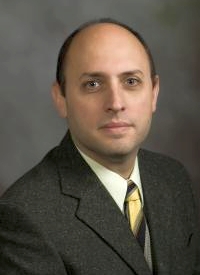An engineering professor at Virginia Tech in Blacksburg is developing an electronic device to help bring back the voice of stroke patients and others who have suffered paralysis of the vocal folds, through electrical stimulation. National Science Foundation awarded Alexander Leonessa (right) awarded a $480,000 Faculty Early Career Development award for his research.
Leonessa’s work is expected to result in a device to stimulate paralyzed vocal folds of stroke patients or others who have lost the ability to talk, or even swallow and breathe properly. Doctors now use an external electrical appendage placed on a paralyzed leg or arm to provide a small electrical shock that can cause muscles to contract. This external shock helps exercise the muscles, and therefore can prevent muscle atrophy and save the leg or arm.
Leonessa says that applying the same method to vocal folds can result in reinnervating the muscle. The folds close and open -– much like eye lids -– to create or release air pressure that vibrates the vocal chords, and makes sound. If one of the flaps is unable to close because of paralysis, no pressure, and thus no sound, can be created.
While the principle of external electrical stimulation may be the same, the muscles in the vocal folds are different and react differently to electricity. Another challenge is a significant delay between stimulation and muscle contraction, adding to the processing and transmission delays in the electrical stimulation system.
Leonessa plans to develop a small, portable device that can be adjusted to each patient. The device itself is expected to be no larger than an iPod, clipped to the belt, and have small wires leading to a patch over the patient’s throat. An company in Atlanta, Georgia will help develop the device, which will come later in the five-year project if the use of electrical stimulation on the vocal folds holds promise for muscle and nerve rejuvenation.
Read more: Drug Reduces Stroke Victim Brain Inflammation, Disability
* * *


 RSS - Posts
RSS - Posts
You must be logged in to post a comment.